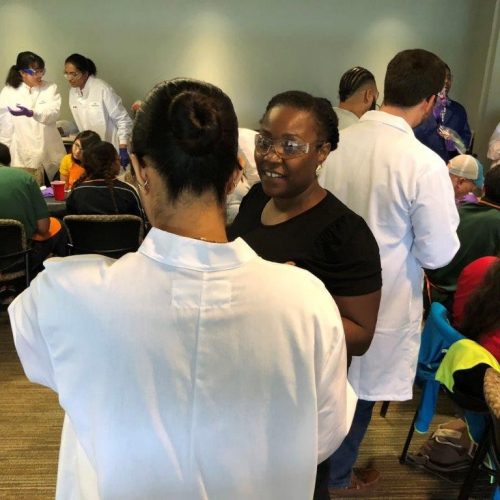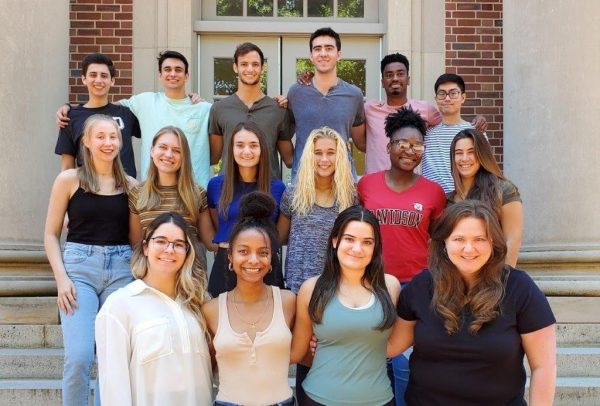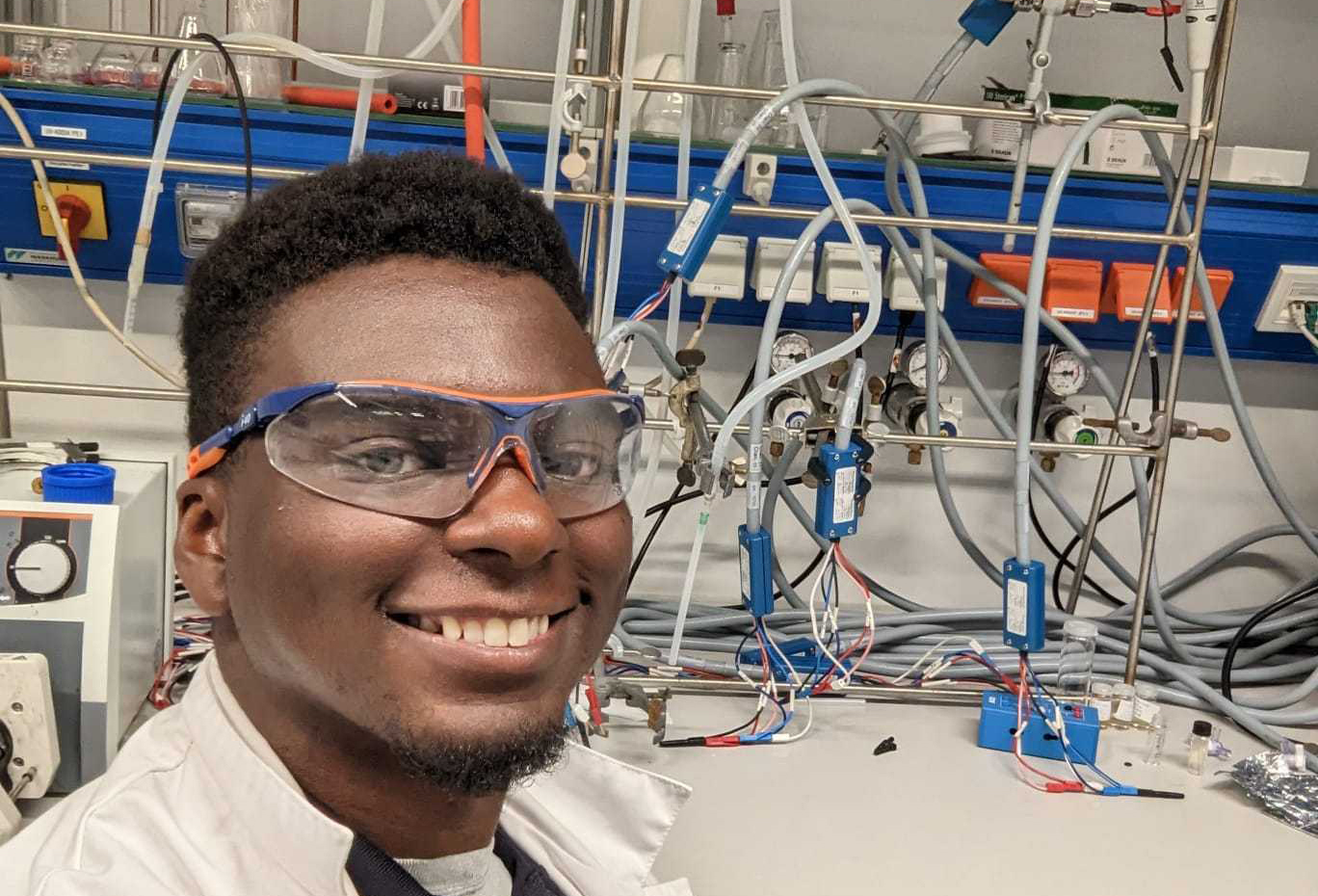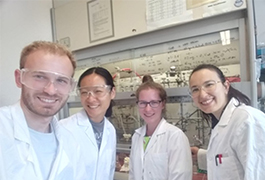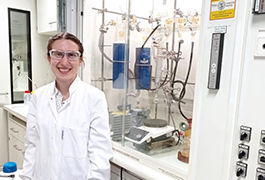Five Tips for Success in the Chemistry Lab
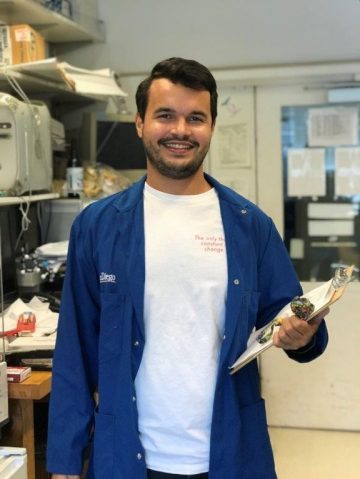
During his first research experience, Javier Sanlley Hernandez made lots of mistakes. He'd forget to add a reagent to a buffer or leave out components of a gel and find himself wondering, 45 minutes later, why it wasn't dry. He wasn't alone. His cohort of undergraduate researchers would often swap slip-up stories over lunch.
Now a biochemistry graduate student at the University of California San Diego, Sanlley Hernandez sees those mistakes as part of the learning process. Lab work requires a unique set of skills, he says. These include making hypotheses, following procedures, analyzing chemical information, handling and disposing of chemicals safely, assessing risk, recording experiment details, and writing scientific reports. Sharpening these skills takes time and practice.
Whether you are doing experiments for class or research, mistakes happen. If the prospect of messing up makes you nervous, here are five ways to set yourself up for success and enter the lab with confidence.
1. Get to know the experiment
Familiarizing yourself with an experiment before stepping into the lab will not only increase your productivity, it will give you a sense of self-assurance. For course labs, prelab work "gives you what you need to be successful," says Dr. Tyrslai M. Williams-Carter, an organic chemist and assistant dean of mentorship, education, and research for the Office of Strategic Initiatives at Louisiana State University. In her teaching experience, Williams-Carter found that well-prepared students were more confident and less likely to turn away from the lab when things didn't go as expected.
In both coursework and research, "understanding what to do when you arrive in the lab lowers downtime and helps you address the critical parts of an experiment faster," says Beau Schweitzer, a chemistry teaching assistant (TA) and graduate student at the University of Wisconsin–Madison. To prepare, identify your lab goals, read background information, and review safety considerations, procedures, and keywords in advance.
Let's say you'll be using a gas chromatograph (GC) to separate a mixture's components. Beforehand, study how the GC works, how to prepare samples, how to operate the instrument, and how to interpret results. Also to prepare, you can learn the carrier gas and its handling instructions, how to check the gas line for leaks, and other potential hazards. To save time, review critical terms such as retention time and attenuation so you don't have to stop and look them up in the lab.
College lab manuals usually include these details, but if you're working on independent research, you may need to be proactive about finding the information you need. Ask your research advisor and lab mates to suggest helpful resources and journal articles. Textbooks, websites, and online how-to guides or videos can be good ways to fill in any gaps in your background knowledge.
2. Work with someone more experienced
Safe lab practices mean never working alone. When you're new to a lab, working with someone who knows the lab and its emergency protocols well is crucial to preventing harm.
Working alongside experienced researchers is also one of the best ways to learn hands-on lab skills. Take advantage of their expertise and ditch the pressure to feel like you should know everything, which can shake your confidence and keep you from asking critical questions or getting validation on a protocol, says Sanlley Hernandez. "A lack of self-confidence can keep you from feeling comfortable in your own space, really digging into your project, and then thinking about how you want to make your own intellectual contributions as time moves on," says Nicole Snyder, chemistry professor and assistant dean for research and creative works at Davidson College.
TAs, research mentors, and experienced lab mates expect undergraduates to ask for help, so don’t hesitate to ask. Asking questions and accepting criticism expand your knowledge and skill set, which increases your self-confidence. That’s another key to research success. You might get advice even when you don't ask for help. If that happens, consider it constructive criticism, says Thomas Pho, a TA, undergrad research mentor, and bioengineering graduate student at Georgia Institute of Technology. You'll get free advice and grow your skills while demonstrating that you're easy to work with, a quality valued by employers and colleagues in the professional world.
3. Practice good lab hygiene
Labs have rules to protect you, others in the lab, the integrity of your work, and lab equipment. Practicing good lab hygiene means following all lab safety rules, including always wearing personal protective equipment (PPE), handling and disposing of chemicals properly, cleaning up spills immediately, labeling everything, and never working alone in the lab. Good lab hygiene also means managing risk and being considerate of others who work in the lab. When you're making good progress in the lab, it can be tempting to put off cleaning or labeling until later, but don't. "It is easy to become lost in your work when in the flow," says Schweitzer. "It is essential to develop a robustly instinctive sense of safety to counter this," he says.

Make a habit of reviewing safety considerations before you go into the lab and be vigilant about your behavior in the lab. When learning something new, always ask your TA or mentor, "What do I need to know to do this safely?" Safety should be your companion even in mundane scenarios. Working with a flask under vacuum? There's a chance it could implode, so examine it closely for cracks every time. "Handle everything carefully," says Chip Nataro, a chemistry professor at Lafayette College. "The second you think something is totally safe is when it bites you." If you have an accident, take care of yourself and others first and then take care of the mess.
4. Learn the equipment
Before you dive into a new experiment, do some reading about the equipment and its limitations. TAs and research advisors usually demonstrate new procedures before allowing you in the lab, so pay close attention and ask questions if you're confused. If you need to use an instrument that you're unfamiliar with, ask your TA or advisor for guidance and how to use it safely. This up-front investment will reduce opportunities for error and increase your overall productivity.
According to Williams-Carter, watching multiple people is a great way to learn the tips and tricks of a new technique or piece of equipment. She advises students to not only watch their TA or mentor demonstrate something new but to also check out YouTube videos on the subject.
Snyder encourages the students working in her research lab to be proactive about learning new techniques. "We're looking at a world that is increasingly interdisciplinary," she says. Being exposed to various techniques can introduce new career possibilities, increase your competitiveness if you plan to attend graduate school, and show you what's possible in research.
5. Document everything
Write down everything you do as you do it in your lab notebook. Slight deviations from a procedure can significantly impact the outcome, and if something goes wrong, you should be able to look through your notes to find out why. In original research, a detailed account also allows others to replicate your process, an essential component of publishing your work.
Williams-Carter recalls a former student who was so frustrated with a particular reaction not coming out correctly that she was ready to discount the idea of a research career. As Williams-Carter looked through the student's lab notebook, the student talked through her process step-by-step. The comparison highlighted three key steps she'd left out and turned the experiment―and the student's attitude toward research―around.
Final thoughts
Lab success doesn't always mean achieving a textbook outcome or publishing a journal article on a new result. Success can honing your lab skills or expanding your work into new areas, says Snyder. Sometimes research ideas don't work. You may encounter time-consuming roadblocks. Or other unexpected problems may arise, like the pandemic, that limit your access to the lab. As long as you're continually building a gallery of knowledge, you can still be successful.
Entering the lab for the first time can be intimidating, but you’ve got this. Have confidence in your ability to learn, develop good habits, ask for help, and prepare ahead of time. And have breakfast, says Sanlley Hernandez. There’s no food―or coffee―allowed inside the lab.

